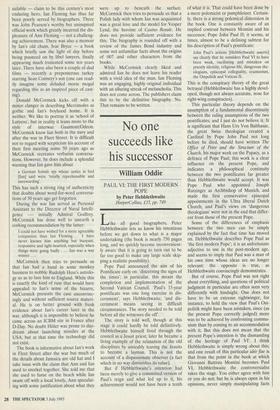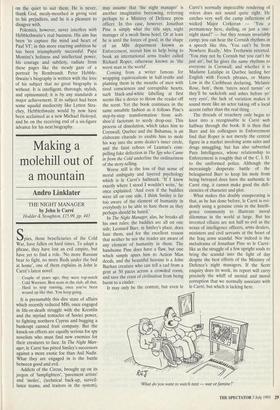No one succeeds like his successor
William Oddie
PAUL VI: THE FIRST MODERN POPE by Peter Hebblethwaite HarperCollins, £35, pp. 749 Like all good biographers, Peter Hebblethwaite lets us know his intentions before we get down to what is a major undertaking (the book is nearly 750 pages long, and we quickly become inconvenient- ly aware that it is going to turn out to be far too good to make any large scale skip- ping a realistic possibility).
Pope Paul announced the aim of his Pontificate early on: 'discerning the signs of the times'; in particular, this meant the completion and implementation of the Second Vatican Council. 'Paul's 15-year pontificate was one long exercise in dis- cernment', says Hebblethwaite; 'and dis- cernment means seeing in difficult circumstances. The story needed to be told before all the witnesses die off'.
The story is told well, though at this stage it could hardly be told definitively. Hebblethwaite himself lived through the council as a Jesuit priest; later he became a living example of the relaxation of the old disciplines by amicably leaving the Jesuits to become a layman. This is not the account of a dispassionate observer (a fact which in no way diminishes its value).
But if Hebblethwaite's intention had been merely to give a committed version of Paul's reign and what led up to it, his achievement would not have been a tenth of what it is. That could have been done by a mere polemicist or pamphleteer. Certain- ly, there is a strong polemical dimension in the book. One is constantly aware of an implied contrast between Montini and his successor, Pope John Paul II; it seems, at times, almost to be a defining subtext for his description of Paul's pontificate:
John Paul's actions [Hebblethwaite asserts] say clearly that he considers Paul VI to have been weak, vacillating and mistaken on priestly identity, religious life, dangerous the- ologians, episcopal collegiality, ecumenism, the Ostpolitik and Vatican II.
This is the conspiracy theory of the great betrayal (Hebblethwaite has a highly devel- oped, though not always accurate, nose for right-wing conspiracies).
This particular theory depends on the assumption of a fundamental discontinuity between the ruling assumptions of the two pontificates; and I just do not believe it. It is significant that Hans Urs Von Balthasar, the great Swiss theologian created a Cardinal by Pope John Paul not long before he died, should have written The Office of Peter and the Structure of the Church, his major work on the Papacy, as a defence of Pope Paul; this work is a clear influence on the present Pope, and indicates a philosophical continuity between the two pontificates far greater than Hebblethwaite would accept. It was Pope Paul who appointed Joseph Ratzinger as Archbishop of Munich, and made the first conservative episcopal appointments in the Ultra liberal Dutch Church; and Paul's views on 'dangerous theologians' were not in the end that differ- ent from those of the present Pope.
Some of the differences of emphasis between the two men can be simply explained by the fact that time has moved on. Hebblethwaite describes Pope Paul as 'the first modern Pope'; it is an unfortunate adjective to use in the post-modern age, and seems to imply that Paul was a man of his own time whose ideas are no longer relevant: the opposite is true, as Hebblethwaite convincingly demonstrates.
But of course, Pope Paul was not right about everything, and questions of political judgment in particular are often seen very differently with hindsight. One does not have to be an extreme rightwinger, for instance, to hold the view that Paul's Ost- politik might have been mistaken, since (as the present Pope correctly judged) more was to be achieved by confronting commu- nism than by coming to an accommodation with it. But this does not mean that the present Pope's intention is 'the dismantling of the heritage of Paul VI'. I think Hebblethwaite is simply wrong about this; and one result of this particular idie fixe is that from the point in the book at which Giovanni Battista Montini becomes Paul VI, Hebblethwaite the controversialist takes the stage. You either agree with him or you do not; but he is always open in his opinions, never simply manipulating facts
on the quiet to suit them. He is never, thank God, mealy-mouthed in giving vent to his prejudices, and he is a pleasure to disagree with.
Polemics, however, never interfere with Hebblethwaite's real business. His aim has been 'to capture the mind and heart of Paul VI'; in this more exacting ambition he has been triumphantly successful. Papa Montini's holiness and intellectual power, his courage and subtlety, radiate from these pages like the steady gaze of a portrait by Rembrandt. Peter Hebble- thwaite's biography is written with the love of his subject that no great biography is without. It is intelligent, thorough, stylish, and opinionated; it is by any standards a major achievement. If its subject had been some squalid mediocrity like Lytton Stra- chey, Hebblethwaite would by now have been acclaimed as a new Michael Holroyd, and be on the receiving end of a six-figure advance for his next biography.



















































 Previous page
Previous page